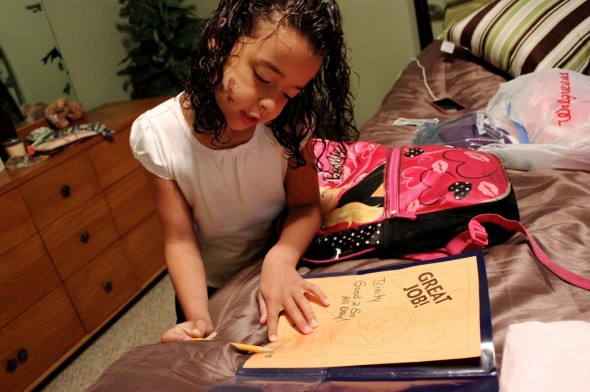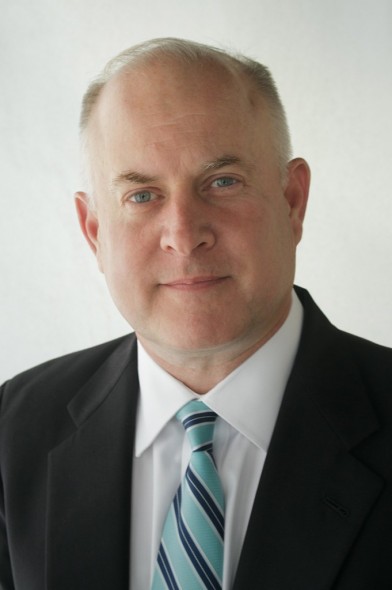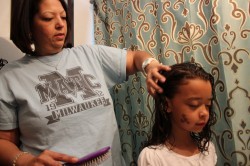Choice Schools Leave Disabled Students Behind?
As voucher schools expand to more cities, critics complain they don't serve disabled students.

Trinity Fitzer, 7, looks at a certificate from her teacher rewarding her for good behavior. Trinity transferred to a public school after a bad experience with a choice school. Rory Linnane/Wisconsin Center for Investigative Journalism
Attending classes at Milwaukee Area Technical College, Kim Fitzer watched the clock, wondering when the calls would come.
Her daughter, Trinity, was attending kindergarten at Northwest Catholic School with a voucher from the state, for the 2011-12 school year. But Trinity, then 6, had gastrointestinal problems and anxiety — conditions that Fitzer said the private school was ill-equipped to address.
Fitzer said the school repeatedly called her to pick up Trinity, saying she was “out of control.” Then one day in March 2012, Fitzer got another call to retrieve Trinity, but this one was different. Trinity had knocked papers to the floor and kicked a teacher who tried to restrain her.
The school, according to Fitzer, said Trinity could not return. In a letter, Northwest Catholic Principal Michelle Paris told Fitzer that Trinity was “withdrawn” from the school “for continuing behavior issues.”
The school, through Paris, said in an email statement that “every decision was made in the very best interest of the child with mutual agreement of our school leadership and the parent.”
But Fitzer said it was not her decision, and she “didn’t have an option.”
Under the state’s parental choice program, Northwest Catholic received a $6,442 voucher for Trinity’s enrollment in the private school.
Trinity ended up having to transfer to a Milwaukee public school, where she has received special education care. But the public school received no additional money for taking her through the end of the school year.
Critics of school choice, and a pending federal lawsuit, charge that students with disabilities, like Trinity, are being underserved by publicly funded vouchers meant to give low-income students in Milwaukee and Racine the chance to have a private education.
With choice programs poised to go statewide, limited to 500 students this year and 1,000 in the following year, some lawmakers have voiced concern that students with disabilities will continue to be left behind.
“The problem with the voucher program is that it cherry-picks which students it’s going to take,” said Rep. Cory Mason, D-Racine. “That’s not really a public education system, when you’re not opening it up to everyone and giving everyone a chance to participate.”
Part of a pattern
A block away from Northwest Catholic is Hawthorne Elementary, a Milwaukee public school. Jane Audette, a social worker there, said the school receives several “cast-off” students every year from Northwest Catholic and other private schools who must be evaluated for special education.
“What has happened over and over with Northwest Catholic is they will tell a parent, ‘Your child needs more than we can give your child, so we suggest you go down the street to Hawthorne,’ ” Audette said.
Although choice schools cannot deny enrollment to a student on the basis of disability, they do not have a legal requirement to meet a student’s special needs, as public schools do.
Accusing choice schools of discrimination, two nonprofit groups advocating for students with disabilities — Disability Rights Wisconsin and the American Civil Liberties Union — filed a lawsuit against the state in 2011. The complaint alleges, “The voucher schools tend not to admit or accommodate students with disabilities.”
“D.E,” one of the complainants in the lawsuit, wanted to enroll her son at Messmer Catholic Schools in Milwaukee. She said she was warned that the school would not be able to provide as many hours of speech therapy as does Milwaukee Public Schools (MPS).
The complaint claims choice schools like Messmer, in flagging the limits of their responsibility to accommodate disabled students, are “discouraging or dissuading families of children with disabilities from even seeking to enroll.”
At the same time, nearly one-third of the 400-plus students who were tracked leaving Milwaukee choice schools for MPS in the first few months of the school year were students with disabilities, according to data obtained by Milwaukee Inner-city Congregations Allied for Hope, an interfaith organization. The data only represent students who went to the MPS Office of Family Services for assistance in transferring, so they are not comprehensive.
In the Racine Unified School District, the only other district that currently has a choice program, choice schools self-reported one student with a disability, out of 165 students who took a state standardized test in 2013. About 18 percent of students in the Racine district had disabilities that year, giving the public schools a much higher concentration of disabled students than that reported by choice schools.
In April, responding to the complaint, the U.S. Department of Justice sent a letter directing the DPI to collect more information about alleged incidences of discrimination.
The letter concluded that because the school choice program is publicly funded, it must meet standards under Title II of the Americans with Disabilities Act, which states that “no qualified individual with a disability shall, by reason of such disability, be excluded from participation in or be denied the benefits of the services … of a public entity.”
In the 2012-13 school year, Milwaukee’s longstanding choice program served almost 25,000 students and cost $155 million, paid mostly by the state and partially by MPS, according to preliminary numbers from the Legislative Fiscal Bureau. Racine’s two-year-old program served about 500 students and cost $3.2 million.
A possible solution
Receiving a maximum of $6,442 per voucher student, choice schools say they encounter budget problems trying to serve students whose special needs may exceed that amount, although donations and other funding sources can give them a boost. Public schools spent an average of $12,376 per student in the 2011-12 school year, DPI reported, including local, state and federal spending.
At Hickman Academy in Milwaukee, where all of the students this year were on vouchers, the school cannot afford a psychologist, speech therapist or special education teachers, said the school secretary, Nicole Johnson. Because the school does not turn away students with disabilities, problems can arise during the school year.
Making matters more difficult, Johnson said, some parents don’t tell the school about their children’s disabilities, because they don’t want them to be treated differently.
“So when we get the children and start working with them, a month or two of school goes by, and we start to see the problems, and see we need to get some help for these children — something is wrong,” Johnson said.
At that point, Johnson said, school officials meet with parents and may refer them to another school with special education services. In the first semester of this school year, data from Milwaukee Inner-city Congregations Allied for Hope show, at least 10 students, seven of whom had disabilities, left Hickman Academy for MPS. The principal did not return messages.
Paris, of Northwest Catholic, said her school has a similar policy.
“If a school determines that they are unable to meet the needs of a student, they may encourage another school placement and recommend that parents withdraw the child,” Paris wrote. She stressed that no child is denied enrollment because of special needs.
Recognizing that it can cost more to support students with disabilities, Gov. Scott Walker initially proposed allocating more than $20 million over the next two years specifically for special education students to attend charter, private or nonresident public schools.
“Parents must have the power to make informed educational choices for their children, and this is especially true for parents who have children with special needs,” Tom Evenson, spokesman for Walker, wrote in an email. “Moving forward, Gov. Walker will continue advocating for children with special needs and their families.”

Scott Jensen, senior adviser for the American Federation for Children, said choice schools would like to provide more special education services but don’t have enough money.
The vouchers would have been worth up to $14,658, according to DPI. That’s more than twice the usual amount, but still less than what public schools spend on the most expensive special needs students. The proposal was removed from the budget by the Joint Finance Committee, the Legislature’s budget-writing panel, in early June, but choice advocates hope to take it up separately in the fall.
“Schools want to be able to educate more special needs students,” said Scott Jensen, senior adviser for the American Federation for Children, a group that promotes school choice. “It’s a matter of funding, and that’s what the scholarship program is designed for.”
However, many advocates for students with disabilities oppose these efforts, saying additional funding would not change the fact that private schools are not legally required to meet students’ special needs.
Even with special needs scholarships, there would be students with more expensive disabilities who would be left out, said Gary Myrah, executive director of the Wisconsin Council of Administrators of Special Services, an association of special education directors and others in the field.
“If you have children with more severe disabilities, as those ramp up and get more severe, you’re not going to have enough money to offset the need for the service,” Myrah said. “In the public school, we’re obligated to provide those services regardless of the severity.”
Lesser requirements
Although they receive public funding, choice schools operate as private schools and are exempt from federal Individuals with Disabilities Education Improvement Act requirements that students’ special needs are met.
For instance, unlike public schools, choice schools do not have to implement Individualized Education Programs (IEPs) for students with disabilities. Regularly updated, IEPs assess a student’s needs and include a plan for serving them. Parents of students with IEPs can request a hearing if they think public schools are failing to implement them.
Students in private schools may obtain IEPs by requesting an evaluation from public school employees, who are required to provide them for students suspected of having a disability. After the evaluation, students may transfer to public schools to get the support mandated by their IEPs. But parents who decide to stay with private schools have no guarantee their children will get specialized services.
“What the private school chooses to do with it is anybody’s guess,” said Julie Paulson, a Racine Unified School District teacher who evaluates public and private students in Racine.
According to DPI, a choice school “is only required to offer those services to assist students with special needs that it can provide with minor adjustments.”
“For example,” DPI spokesman Patrick Gasper said, “if a student in a wheelchair decides to go to a private school, there’s nothing requiring that school to put in ramps.”
The Wisconsin Religious and Independent Schools Accreditation, a nonprofit agency that accredits choice schools, does not mandate any special education services.
“When a parent chooses to enroll his/her child in a ‘choice’ school, it is my understanding (based on Wisconsin Department of Public Education documents) that the parent surrenders the child’s legal rights to funding and special educational services as mandated in an IEP,” Beatrice Weiland, the agency’s executive director, wrote in an email.
And while Weiland said all schools strive to serve their students’ needs, a number of factors can get in the way, including “a lack of additional funding that would support the additional educational programming and staffing needs.”
The money trail
Choice schools receive half of the $6,442 voucher amount for any students who make it past the third Friday of September, when enrollment is tallied, whether or not they complete the year, according to the DPI’s Gasper. Choice schools get the second half for any students who are there on the second Friday in January, when there is a second enrollment count.
Some advocates say this creates an incentive for them to accept students they can’t fully serve.
“We have seen that children with behavioral issues are signed into a voucher school and once they get past the third Friday — the Kodak moment for determining headcount — there’s a phenomenon that occurs that students are no longer able to participate in the private school,” said Myrah, with the Wisconsin Council of Administrators of Special Services.
Audette, at MPS, said some families leave private schools because of disabilities that become apparent as their children get older. But she said others enter with false ideas about what the schools can offer, attracted by factors like small class-size, door-to-door transportation or even the name of the school.
“There are plenty of schools recruiting kids that they shouldn’t be recruiting,” Audette said. “It can be true that they have smaller class sizes, but it’s not necessarily a better school.”
Paulson, with the Racine Unified School District, offered similar observations.
“I think parents are often told the classes will be smaller, our kids are kinder, different messages like that,” Paulson said. “As I’ve sat in these rooms, that isn’t necessarily true. They have just as many students with a lot less trained support for these kids. When they return to us, it can be challenging to get them back on track.”
Since state aid to public schools is based on the enrollment of the previous year, public schools who take in voucher students after the third Friday of September do not get funding for those students the following year.
The public-school difference
Scott Schroder, who taught science at a choice school in Racine last year, said he thought some of his students lacked special education support that would have been legally required in a public school.
Schroder said he had to step into the role of a special educator for certain students in his classroom at the choice school, St. John Fisher Academy, devising strategies to help them pass tests. He worries that choice schools lack the expertise to accommodate special needs students — or the money needed to hire staff who can.
“I’m not a doctor, and I’m not a special education teacher,” said Schroder, whose school shut down in 2012 after failing to pay its teachers, citing a lack of funds.

Kim Fitzer helps her daughter Trinity, 7, get ready for school. Trinity transferred to a public school after a bad experience with a choice school. Rory Linnane/Wisconsin Center for Investigative Journalism
Trinity still attends a Milwaukee public school, Gilbert Stuart Elementary. She has a formal educational plan, is in a small class to help with her anxiety and has a teacher with special education skills.
As Trinity got ready for school one recent morning, between brushing her hair and skipping out the door, she stopped at the kitchen table to drink from a blue cup. “I have to take my medicine,” she said, as she downed an antidepressant to help with her anxiety.
At the sidewalk in front of her daughter’s school, Fitzer let go of Trinity’s hand and watched her disappear inside, with a stream of other students. She is happy about her daughter’s new school.
“It feels better that I can know that she’s going to be OK,” she said.
The nonprofit Wisconsin Center for Investigative Journalism (www.WisconsinWatch.org) collaborates with Wisconsin Public Radio, Wisconsin Public Television, other news media and the UW-Madison School of Journalism and Mass Communication.
All works created, published, posted or disseminated by the Center do not necessarily reflect the views or opinions of UW-Madison or any of its affiliates.
-
Wisconsin Lacks Clear System for Tracking Police Caught Lying
 May 9th, 2024 by Jacob Resneck
May 9th, 2024 by Jacob Resneck
-
Voters With Disabilities Demand Electronic Voting Option
 Apr 18th, 2024 by Alexander Shur
Apr 18th, 2024 by Alexander Shur
-
Few SNAP Recipients Reimbursed for Spoiled Food
 Apr 9th, 2024 by Addie Costello
Apr 9th, 2024 by Addie Costello




















